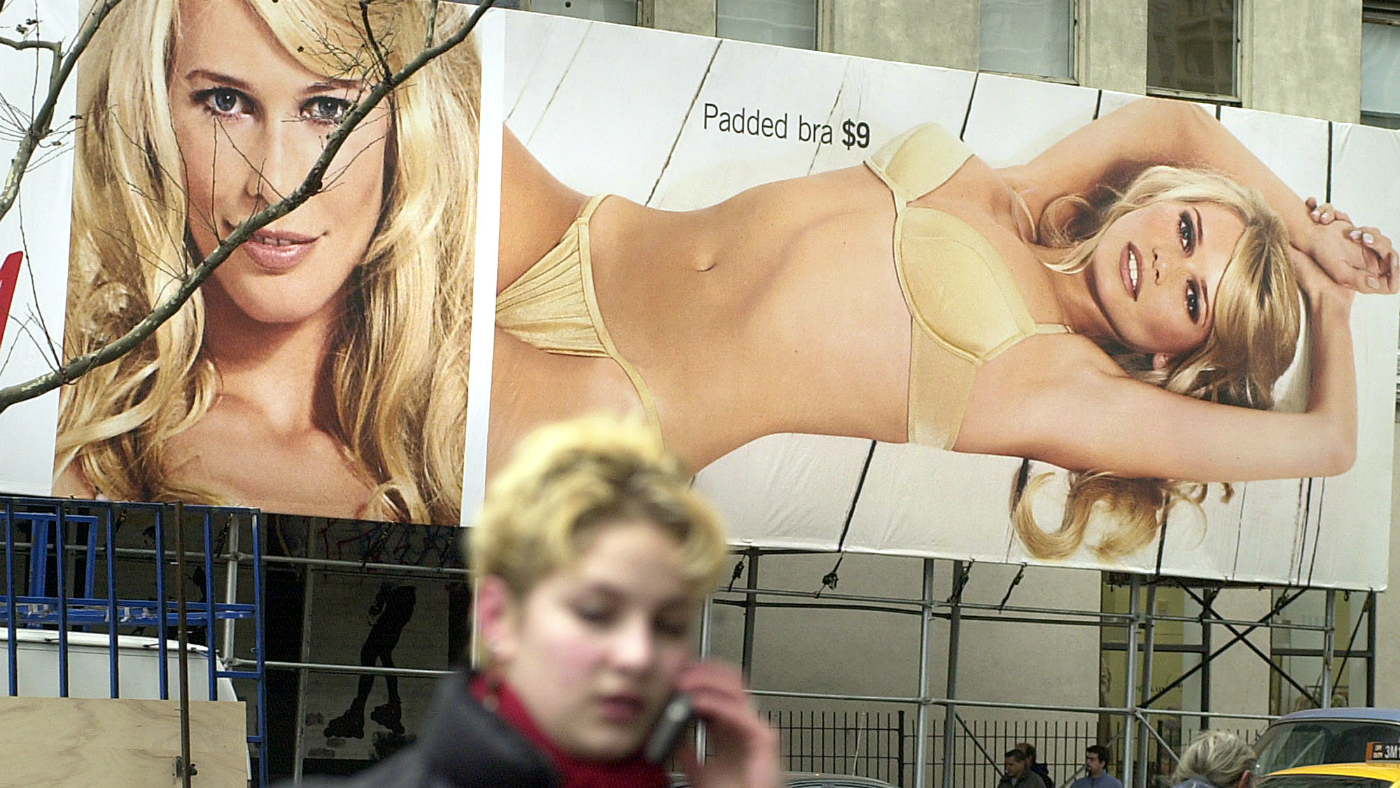How advertisers play the mind game
Adverts surround us, but to what extend do they distort our view of ourselves and the world?

A free daily email with the biggest news stories of the day – and the best features from TheWeek.com
You are now subscribed
Your newsletter sign-up was successful
"So easy even dads can do it".
"Sometimes your family's active lifestyle creates the sort of stains and laundry challenges that require some serious mum power."
Many adverts rely on assumptions about gender and social roles to sell products, but we rarely debate the psychology of advertising before deciding which detergent to buy.
The Week
Escape your echo chamber. Get the facts behind the news, plus analysis from multiple perspectives.

Sign up for The Week's Free Newsletters
From our morning news briefing to a weekly Good News Newsletter, get the best of The Week delivered directly to your inbox.
From our morning news briefing to a weekly Good News Newsletter, get the best of The Week delivered directly to your inbox.
The Advertising Standards Authority thinks it is about time we did and is drawing up tough guidelines to ban inappropriate commercials.
Not that this is the first time stereotypical ads have been subject to public debate. Last year saw a furore over a protein drink advert featuring a bikini-clad woman asking: "Are you beach body ready?"
Nearly 400 complaints were made, with many saying the advert shamed women who did not conform to a supposed "ideal" and could exacerbate body image issues. Around 70,000 signed a petition calling for the campaign to be removed.
Campaigners claim advertising reinforces gender stereotypes and exploits insecurities about appearance and behaviour. But do they really twist the way we see ourselves - and the rest of the world?
A free daily email with the biggest news stories of the day – and the best features from TheWeek.com
The Oxo mum
A 2014 study from advertising giant Saatchi & Saatchi found mothers had strong feelings about the way they are depicted in adverts.
Only one in five could recall relating to any advertising they’d viewed. Idealised depictions of domestic life, overseen by a calm and competent maternal figure - exemplified by Lynda Bellingham in the popular Oxo adverts in the 1980s and 1990s - failed to resonate.
However, there were also concerns about adverts portraying stressed-out mums on the verge of a breakdown.
"Most mums have clutter, but not chaos; tidiness but not perfection," one told researchers. "We are all second-guessing ourselves all of the time so making it more difficult doesn’t help."
"Dumb dad" adverts portraying incompetent men failing to perform domestic tasks such as cleaning or childcare have also been the target of anger.
Noticeably absent are depictions of men as "stupid about serious subjects, or incompetent at running anything outside the domestic sphere", says Daily Kos.
By portraying men as inherently unsuited to domestic tasks, these "dumb dad" adverts actually "affirm, rather than challenge sexist notions of women's work and women's place".
Woman's work
Feminists have long identified advertising as one of the subtle cultural influences that continue to push women towards traditional life choices - not only marriage and motherhood, but also career paths historically seen as "feminine".
Baby formula brand Aptamil was criticised for an advert showing little girls growing up to be ballerinas, while little boys were future mathematicians and mountain climbers.

While the precise influence of the media on life choices is difficult to quantify, a correlation has been found between advertising and gender performance, although the most up-to-date research suggests women are becoming more resistant to such messages.
A 1984 study found women who watched a compilation of adverts portraying traditional gender roles were more likely to de-emphasise professional aspirations when asked about their ambitions.
However, when researchers repeated the study in 2008, they discovered "women's achievement scripts now appear more similar to men's, as well as more resistant to sexist exposure".
Advertising has also been proven to affect the way men think about women and treat them in the professional world.
Men who watched a compilation of advertising that sexualised women were more likely to ask a female candidate personal questions in a job interview task, according to a 1995 study. The also rated her as less competent than interviewers from a control group.
Researchers concluded that sexualised ads may create "a cultural climate in which treating women as sex objects is viewed as appropriate".
Mirror, mirror on the wall
Probably the most well-documented social side effect of gendered advertising is the negative impact on body image, with dozens of studies indicating they enforce the idea of a "perfect" body - often making us miserable in the process.
Girlguiding UK found body image issues were rampant among girls and young women, with 38 per cent of seven to 21-year-olds saying they were unhappy with the way they looked.
In response, Anne Longfield, the children’s commissioner for England, said girls were being "bombarded with images in the media" which exacerbated insecurities about their appearance.
In a 2007 study, women asked to look at magazine ads portraying thin models subsequently "reported greater state self-objectification, weight-related appearance anxiety, negative mood, and body dissatisfaction".
A growing body of research also argues that physical ideals harm men and boys as week.
Men and boys are now thought to make up a quarter of those suffering eating disorders, while The Atlantic reports a rise in the use of muscle-enhancing supplements and steroids among teenage boys keen to emulate male bodies seen in the media.
"The media has become more of an equal opportunity discriminator," Dr Raymond Lemberg, an expert on male eating disorders, said. "Men’s bodies are not good enough anymore either."
-
 Why are election experts taking Trump’s midterm threats seriously?
Why are election experts taking Trump’s midterm threats seriously?IN THE SPOTLIGHT As the president muses about polling place deployments and a centralized electoral system aimed at one-party control, lawmakers are taking this administration at its word
-
 ‘Restaurateurs have become millionaires’
‘Restaurateurs have become millionaires’Instant Opinion Opinion, comment and editorials of the day
-
 Earth is rapidly approaching a ‘hothouse’ trajectory of warming
Earth is rapidly approaching a ‘hothouse’ trajectory of warmingThe explainer It may become impossible to fix
-
 Instant Opinion: this year’s Golden Globes ‘missed the mark’
Instant Opinion: this year’s Golden Globes ‘missed the mark’In Depth Your guide to the best columns and commentary on Tuesday 7 January
-
 Why British couple are hiding their baby’s gender
Why British couple are hiding their baby’s genderSpeed Read Friends and family asked to refer to 17-month-old as ‘they’
-
 Anti-avocado Costa ad banned by watchdog
Anti-avocado Costa ad banned by watchdogSpeed Read Radio spot suggested customers swap the fruit for a bacon roll
-
 Why McDonald’s Happy Meals are officially ‘healthy’
Why McDonald’s Happy Meals are officially ‘healthy’In Depth Fast-food children’s menu gets the green light from UK advertising watchdog
-
 Sexism ‘kills 239,000 girls a year in India’
Sexism ‘kills 239,000 girls a year in India’In Depth Study finds female children die at higher rates than males in 29 of India’s 35 states
-
 Sex question to become optional on census
Sex question to become optional on censusSpeed Read Britain to be first country not to require people to officially state their gender
-
 Tube staff told not to say 'ladies and gentlemen'
Tube staff told not to say 'ladies and gentlemen'In Depth TfL employees must stick to 'inclusive' gender-neutral language
-
 Harvard men's football team suspended over sexist comments
Harvard men's football team suspended over sexist commentsSpeed Read Ivy League university cancels rest of season after student newspaper uncovers lewd ratings league for female team